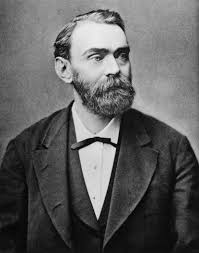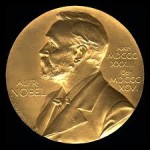Invention of Dynamite and Nobel Prize
Nobel Prize was instituted by Alfred Nobel (1833-1896), inventor of dynamite. Through the will, he donated his fortune to establish the Nobel prizes.
Childhood of Alfred Nobel
Alfred Nobel was born on 21 October 1833 in Stockholm, Sweden to Immanuel Nobel, a producer and dealer of armaments. Alfred Nobel had a weak spine and was taught at home. As he could not play like other boys, he befriended with books, reading books on all subjects. Gradually, he grew into an able young man. His father sent him on a world trip to learn business and make contacts. During the two year period, he covered various places like Paris, London, Copenhagen, Hamburg etc. After returning, he started assisting his father in business.
Meanwhile, a war broke out in 1853 between Russia and an alliance of the Ottoman Empire, Britain, France, and sardine. The war that lasted for three years boosted the business of the Nobels. They invested heavily in business. But the war ended in 1863 inflicting huge loss on the family. Finally, Immanuel Nobel was declared bankrupt.
Invention of dynamite
The Nobels had to continue with experiments for survival. They got interested in nitroglycerine, a highly explosive chemical invented by an Italian chemist. But handling liquid nitroglycerine in room temperature was extremely difficult. Alfred devised a detonator and experimented with it which ended in an explosion killing his brother along with four workers and destroying the factory completely.
They had no option other than continuing with hard work and shifted to Hamburg. Alfred discovered that kieselguhr, a kind of clay, was excellent for subsiding the explosive characteristic of nitroglycerine. The clay could be moulded into the desired shape and was safe enough to transport nitroglycerine over long distance. Alfred patented his invention in 1866 under the name ‘dynamite’ and started commercial production.
Flourishing explosive business
Dynamite could be used for various explosive purposes and the demand for it made their business flourish. Alfred set up factories in many European countries and the USA. He went on to invent another explosive, blasting gelatin, by combining nitroglycerine and nitrocellulose with camphor to produce ballistic. Another smokeless powder was produced for military use. Alfred Nobel continued his experiments and registered about 350 inventions in his name.
The use of dynamite and other explosives aided mining, construction of tunnels, dams, highways etc. However, he was labelled ‘merchant of death’ as his inventions were used in wars to kill people too. The thinking and influence of his secretary , Baroness Bartha, influenced him towards disarmament. But he was too proud to acknowledge that he was wrong and they finally parted ways.
Accidental reading of own obituary
When Alfred’s brother expired, a newspaper ran a long obituary on Alfred Nobel , falsely believing that it was he who had passed away. The article horrified him as the new paper described him as a man who had made it possible to kill more people more quickly than anyone else who ever lived.
Formation of Nobel Prize foundation
The contents of his obituary made him aware how he was going to be remembered. He did not want to be remembered like that and shortly established the Nobel awards. In 1895, one year before his death, he willed most of his fortune to a trust to be managed jointly by Swedish and Norwegian trustees. At that time, the amount set apart was 31 million Swedish Krona ( presently around 265 million dollars). The interest earned on this fund was to be apportioned into five portions and awarded to those making the greatest contribution in the fields of chemistry, physics, physiology or medicine, literature and peace. Economics was not in the initial list.
Alfred Nobel passed away on 10 December 1896 in San Remo, Italy. As Nobel hoped, the Nobel prizes elevated him to the position of a great benefactor of mankind.
More about Alfred Nobel and Nobel Prize
• Alfred Nobel had many talents and worked as chemist, engineer and industrialist.
• The nobel prizes are announced in advanced but prize distribution happens on every December 10th, conciding with his death anniversary.
• First Nobel prize was awarded in 1901, five years after his death.
• The Nobel prizes for Physics, Chemistry, Medicine, Literature and economics are awarded at a ceremony in Stockholm, Sweden while that of peace is awarded at a different ceremony in Oslo, Norway
• The inscription on the Nobel Peace medal is ‘ for the peace and brotherhood of men’. The inscriptions on other medals mean’ inventions enhance life which is beautified through art’. Nobel Prize and Categories: An Overview
What is Gravitational Wave? Do they exist?
What is biological clock (circadian rhythm)?









